Commercial Law Assignment: Partnership, Agency, and Contract Issues
VerifiedAdded on 2021/02/21
|7
|2111
|17
Report
AI Summary
This commercial law report provides an in-depth analysis of key legal concepts. The report begins by differentiating between partnerships and joint ventures, discussing the roles of silent and limited partners, and outlining the consequences of non-registration of a partnership firm. It then addresses a scenario involving partners, offering advice on loan liabilities, profit entitlements, and partner expulsion. The report further delves into the fundamentals of contract of agency, exploring the roles of agents and principals, and the liabilities associated with agency agreements. The analysis includes relevant case laws and statutory provisions, offering practical advice to the parties involved in the scenarios. This report offers a comprehensive understanding of commercial law principles, providing valuable insights into the legal framework governing business relationships.
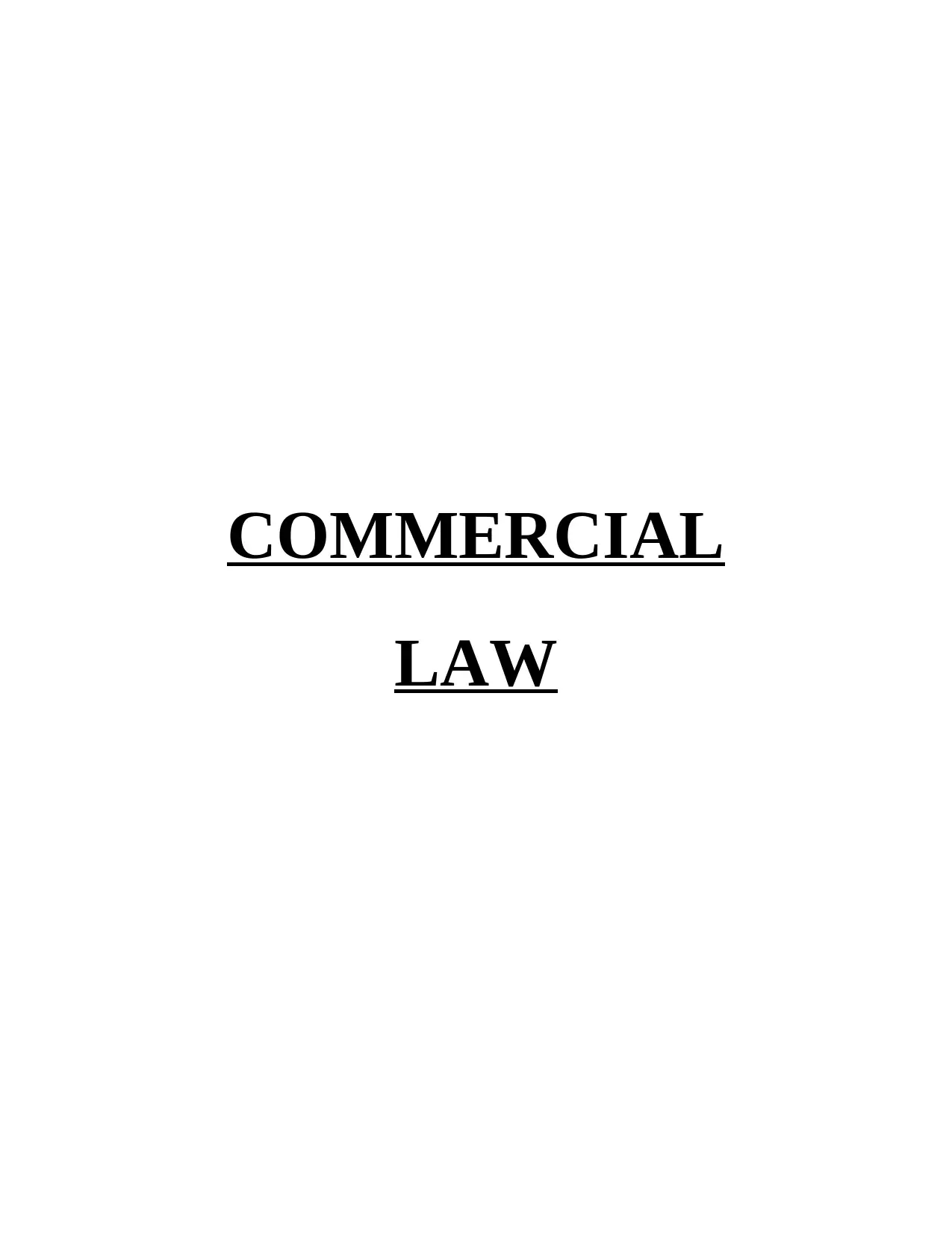
COMMERCIAL
LAW
LAW
Paraphrase This Document
Need a fresh take? Get an instant paraphrase of this document with our AI Paraphraser
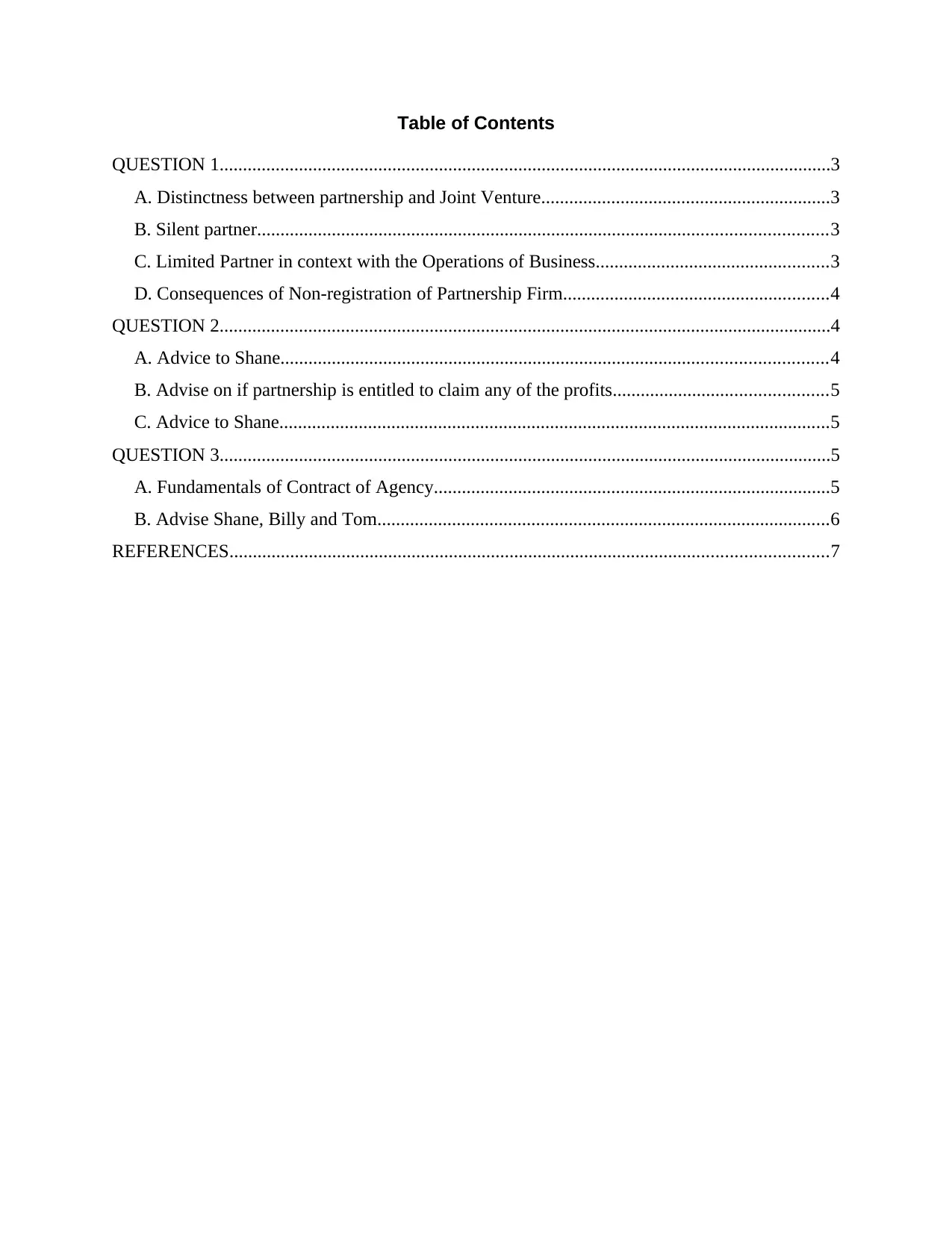
Table of Contents
QUESTION 1...................................................................................................................................3
A. Distinctness between partnership and Joint Venture..............................................................3
B. Silent partner..........................................................................................................................3
C. Limited Partner in context with the Operations of Business..................................................3
D. Consequences of Non-registration of Partnership Firm.........................................................4
QUESTION 2...................................................................................................................................4
A. Advice to Shane.....................................................................................................................4
B. Advise on if partnership is entitled to claim any of the profits..............................................5
C. Advice to Shane......................................................................................................................5
QUESTION 3...................................................................................................................................5
A. Fundamentals of Contract of Agency.....................................................................................5
B. Advise Shane, Billy and Tom.................................................................................................6
REFERENCES................................................................................................................................7
QUESTION 1...................................................................................................................................3
A. Distinctness between partnership and Joint Venture..............................................................3
B. Silent partner..........................................................................................................................3
C. Limited Partner in context with the Operations of Business..................................................3
D. Consequences of Non-registration of Partnership Firm.........................................................4
QUESTION 2...................................................................................................................................4
A. Advice to Shane.....................................................................................................................4
B. Advise on if partnership is entitled to claim any of the profits..............................................5
C. Advice to Shane......................................................................................................................5
QUESTION 3...................................................................................................................................5
A. Fundamentals of Contract of Agency.....................................................................................5
B. Advise Shane, Billy and Tom.................................................................................................6
REFERENCES................................................................................................................................7
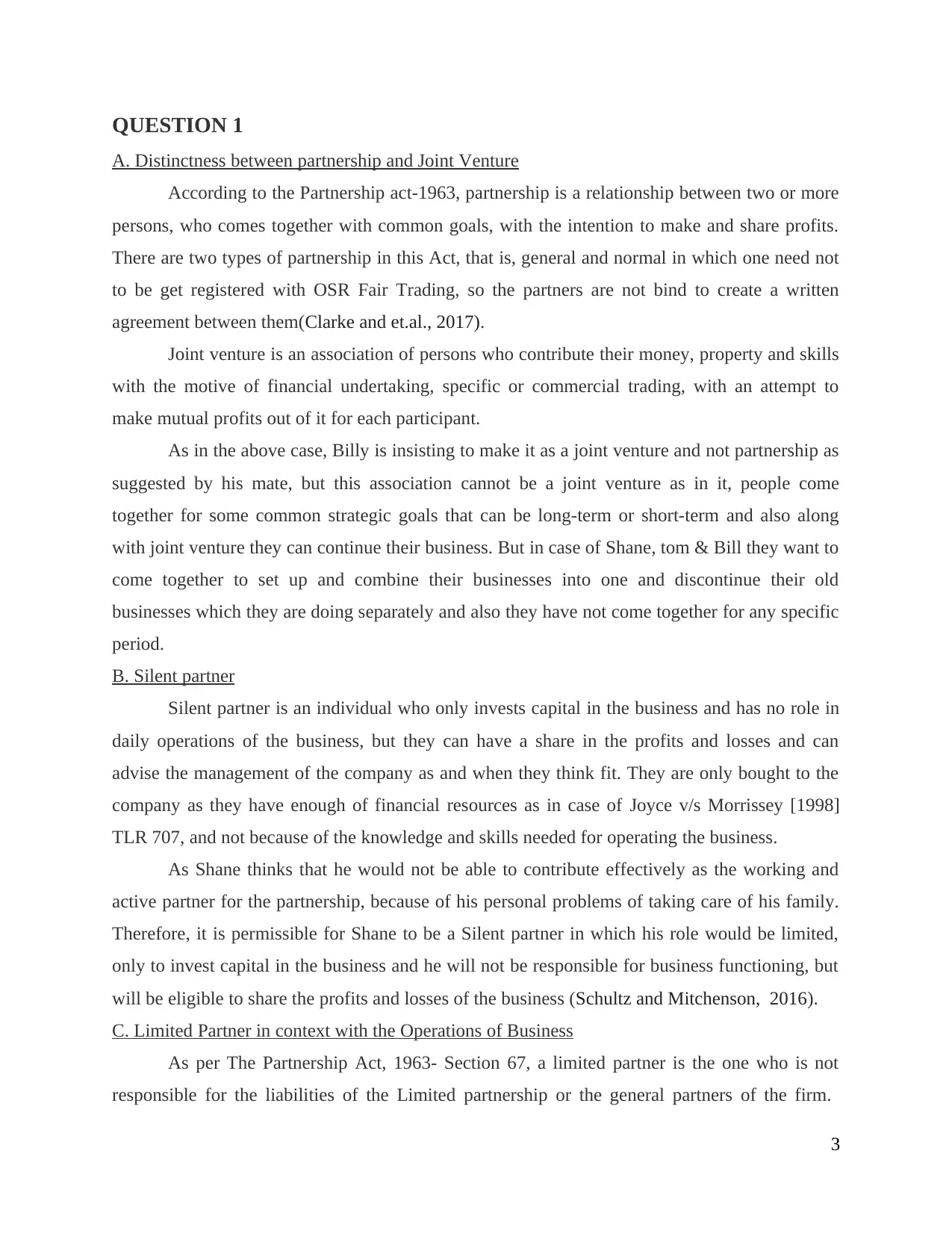
QUESTION 1
A. Distinctness between partnership and Joint Venture
According to the Partnership act-1963, partnership is a relationship between two or more
persons, who comes together with common goals, with the intention to make and share profits.
There are two types of partnership in this Act, that is, general and normal in which one need not
to be get registered with OSR Fair Trading, so the partners are not bind to create a written
agreement between them(Clarke and et.al., 2017).
Joint venture is an association of persons who contribute their money, property and skills
with the motive of financial undertaking, specific or commercial trading, with an attempt to
make mutual profits out of it for each participant.
As in the above case, Billy is insisting to make it as a joint venture and not partnership as
suggested by his mate, but this association cannot be a joint venture as in it, people come
together for some common strategic goals that can be long-term or short-term and also along
with joint venture they can continue their business. But in case of Shane, tom & Bill they want to
come together to set up and combine their businesses into one and discontinue their old
businesses which they are doing separately and also they have not come together for any specific
period.
B. Silent partner
Silent partner is an individual who only invests capital in the business and has no role in
daily operations of the business, but they can have a share in the profits and losses and can
advise the management of the company as and when they think fit. They are only bought to the
company as they have enough of financial resources as in case of Joyce v/s Morrissey [1998]
TLR 707, and not because of the knowledge and skills needed for operating the business.
As Shane thinks that he would not be able to contribute effectively as the working and
active partner for the partnership, because of his personal problems of taking care of his family.
Therefore, it is permissible for Shane to be a Silent partner in which his role would be limited,
only to invest capital in the business and he will not be responsible for business functioning, but
will be eligible to share the profits and losses of the business (Schultz and Mitchenson, 2016).
C. Limited Partner in context with the Operations of Business
As per The Partnership Act, 1963- Section 67, a limited partner is the one who is not
responsible for the liabilities of the Limited partnership or the general partners of the firm.
3
A. Distinctness between partnership and Joint Venture
According to the Partnership act-1963, partnership is a relationship between two or more
persons, who comes together with common goals, with the intention to make and share profits.
There are two types of partnership in this Act, that is, general and normal in which one need not
to be get registered with OSR Fair Trading, so the partners are not bind to create a written
agreement between them(Clarke and et.al., 2017).
Joint venture is an association of persons who contribute their money, property and skills
with the motive of financial undertaking, specific or commercial trading, with an attempt to
make mutual profits out of it for each participant.
As in the above case, Billy is insisting to make it as a joint venture and not partnership as
suggested by his mate, but this association cannot be a joint venture as in it, people come
together for some common strategic goals that can be long-term or short-term and also along
with joint venture they can continue their business. But in case of Shane, tom & Bill they want to
come together to set up and combine their businesses into one and discontinue their old
businesses which they are doing separately and also they have not come together for any specific
period.
B. Silent partner
Silent partner is an individual who only invests capital in the business and has no role in
daily operations of the business, but they can have a share in the profits and losses and can
advise the management of the company as and when they think fit. They are only bought to the
company as they have enough of financial resources as in case of Joyce v/s Morrissey [1998]
TLR 707, and not because of the knowledge and skills needed for operating the business.
As Shane thinks that he would not be able to contribute effectively as the working and
active partner for the partnership, because of his personal problems of taking care of his family.
Therefore, it is permissible for Shane to be a Silent partner in which his role would be limited,
only to invest capital in the business and he will not be responsible for business functioning, but
will be eligible to share the profits and losses of the business (Schultz and Mitchenson, 2016).
C. Limited Partner in context with the Operations of Business
As per The Partnership Act, 1963- Section 67, a limited partner is the one who is not
responsible for the liabilities of the Limited partnership or the general partners of the firm.
3
⊘ This is a preview!⊘
Do you want full access?
Subscribe today to unlock all pages.

Trusted by 1+ million students worldwide
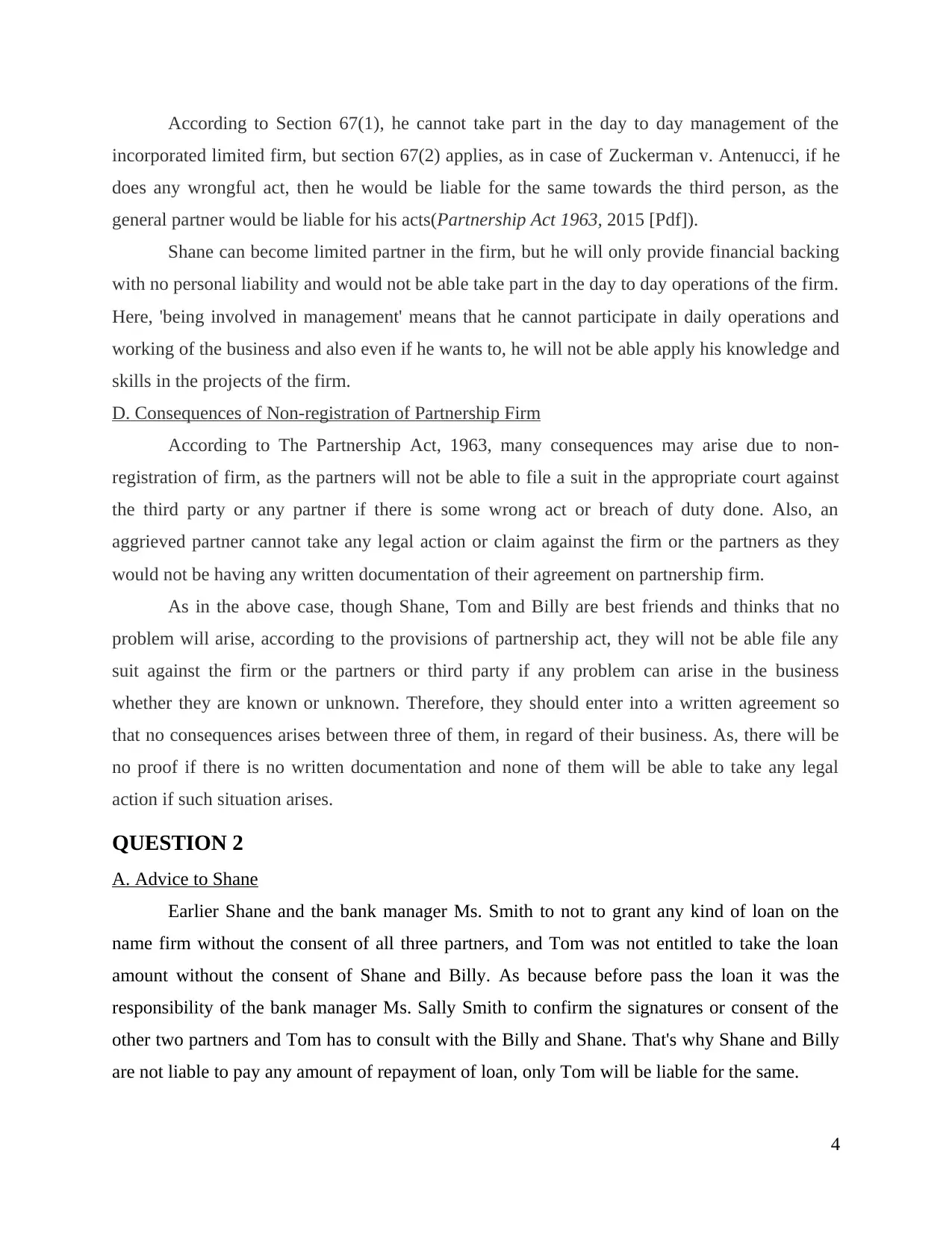
According to Section 67(1), he cannot take part in the day to day management of the
incorporated limited firm, but section 67(2) applies, as in case of Zuckerman v. Antenucci, if he
does any wrongful act, then he would be liable for the same towards the third person, as the
general partner would be liable for his acts(Partnership Act 1963, 2015 [Pdf]).
Shane can become limited partner in the firm, but he will only provide financial backing
with no personal liability and would not be able take part in the day to day operations of the firm.
Here, 'being involved in management' means that he cannot participate in daily operations and
working of the business and also even if he wants to, he will not be able apply his knowledge and
skills in the projects of the firm.
D. Consequences of Non-registration of Partnership Firm
According to The Partnership Act, 1963, many consequences may arise due to non-
registration of firm, as the partners will not be able to file a suit in the appropriate court against
the third party or any partner if there is some wrong act or breach of duty done. Also, an
aggrieved partner cannot take any legal action or claim against the firm or the partners as they
would not be having any written documentation of their agreement on partnership firm.
As in the above case, though Shane, Tom and Billy are best friends and thinks that no
problem will arise, according to the provisions of partnership act, they will not be able file any
suit against the firm or the partners or third party if any problem can arise in the business
whether they are known or unknown. Therefore, they should enter into a written agreement so
that no consequences arises between three of them, in regard of their business. As, there will be
no proof if there is no written documentation and none of them will be able to take any legal
action if such situation arises.
QUESTION 2
A. Advice to Shane
Earlier Shane and the bank manager Ms. Smith to not to grant any kind of loan on the
name firm without the consent of all three partners, and Tom was not entitled to take the loan
amount without the consent of Shane and Billy. As because before pass the loan it was the
responsibility of the bank manager Ms. Sally Smith to confirm the signatures or consent of the
other two partners and Tom has to consult with the Billy and Shane. That's why Shane and Billy
are not liable to pay any amount of repayment of loan, only Tom will be liable for the same.
4
incorporated limited firm, but section 67(2) applies, as in case of Zuckerman v. Antenucci, if he
does any wrongful act, then he would be liable for the same towards the third person, as the
general partner would be liable for his acts(Partnership Act 1963, 2015 [Pdf]).
Shane can become limited partner in the firm, but he will only provide financial backing
with no personal liability and would not be able take part in the day to day operations of the firm.
Here, 'being involved in management' means that he cannot participate in daily operations and
working of the business and also even if he wants to, he will not be able apply his knowledge and
skills in the projects of the firm.
D. Consequences of Non-registration of Partnership Firm
According to The Partnership Act, 1963, many consequences may arise due to non-
registration of firm, as the partners will not be able to file a suit in the appropriate court against
the third party or any partner if there is some wrong act or breach of duty done. Also, an
aggrieved partner cannot take any legal action or claim against the firm or the partners as they
would not be having any written documentation of their agreement on partnership firm.
As in the above case, though Shane, Tom and Billy are best friends and thinks that no
problem will arise, according to the provisions of partnership act, they will not be able file any
suit against the firm or the partners or third party if any problem can arise in the business
whether they are known or unknown. Therefore, they should enter into a written agreement so
that no consequences arises between three of them, in regard of their business. As, there will be
no proof if there is no written documentation and none of them will be able to take any legal
action if such situation arises.
QUESTION 2
A. Advice to Shane
Earlier Shane and the bank manager Ms. Smith to not to grant any kind of loan on the
name firm without the consent of all three partners, and Tom was not entitled to take the loan
amount without the consent of Shane and Billy. As because before pass the loan it was the
responsibility of the bank manager Ms. Sally Smith to confirm the signatures or consent of the
other two partners and Tom has to consult with the Billy and Shane. That's why Shane and Billy
are not liable to pay any amount of repayment of loan, only Tom will be liable for the same.
4
Paraphrase This Document
Need a fresh take? Get an instant paraphrase of this document with our AI Paraphraser
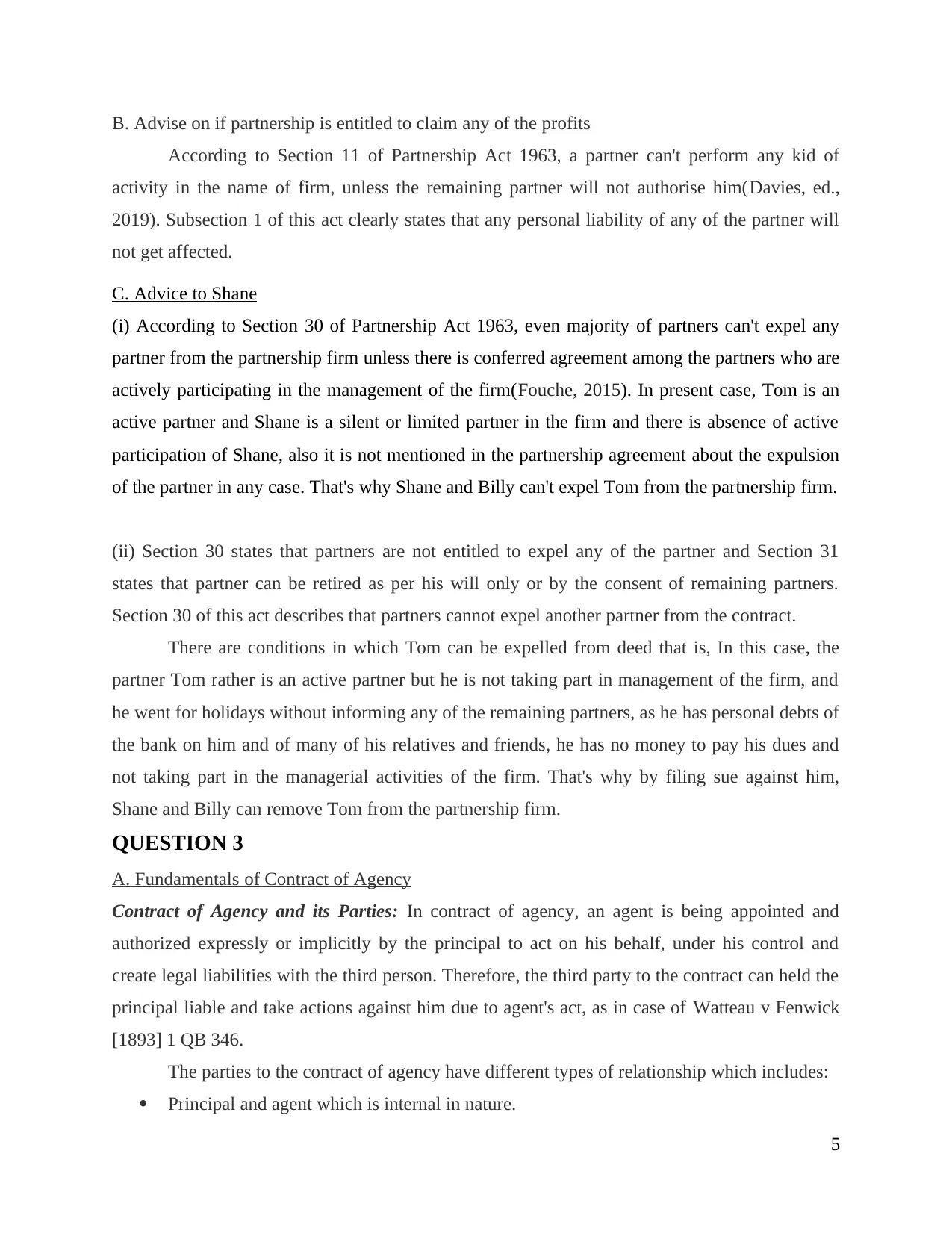
B. Advise on if partnership is entitled to claim any of the profits
According to Section 11 of Partnership Act 1963, a partner can't perform any kid of
activity in the name of firm, unless the remaining partner will not authorise him(Davies, ed.,
2019). Subsection 1 of this act clearly states that any personal liability of any of the partner will
not get affected.
C. Advice to Shane
(i) According to Section 30 of Partnership Act 1963, even majority of partners can't expel any
partner from the partnership firm unless there is conferred agreement among the partners who are
actively participating in the management of the firm(Fouche, 2015). In present case, Tom is an
active partner and Shane is a silent or limited partner in the firm and there is absence of active
participation of Shane, also it is not mentioned in the partnership agreement about the expulsion
of the partner in any case. That's why Shane and Billy can't expel Tom from the partnership firm.
(ii) Section 30 states that partners are not entitled to expel any of the partner and Section 31
states that partner can be retired as per his will only or by the consent of remaining partners.
Section 30 of this act describes that partners cannot expel another partner from the contract.
There are conditions in which Tom can be expelled from deed that is, In this case, the
partner Tom rather is an active partner but he is not taking part in management of the firm, and
he went for holidays without informing any of the remaining partners, as he has personal debts of
the bank on him and of many of his relatives and friends, he has no money to pay his dues and
not taking part in the managerial activities of the firm. That's why by filing sue against him,
Shane and Billy can remove Tom from the partnership firm.
QUESTION 3
A. Fundamentals of Contract of Agency
Contract of Agency and its Parties: In contract of agency, an agent is being appointed and
authorized expressly or implicitly by the principal to act on his behalf, under his control and
create legal liabilities with the third person. Therefore, the third party to the contract can held the
principal liable and take actions against him due to agent's act, as in case of Watteau v Fenwick
[1893] 1 QB 346.
The parties to the contract of agency have different types of relationship which includes:
Principal and agent which is internal in nature.
5
According to Section 11 of Partnership Act 1963, a partner can't perform any kid of
activity in the name of firm, unless the remaining partner will not authorise him(Davies, ed.,
2019). Subsection 1 of this act clearly states that any personal liability of any of the partner will
not get affected.
C. Advice to Shane
(i) According to Section 30 of Partnership Act 1963, even majority of partners can't expel any
partner from the partnership firm unless there is conferred agreement among the partners who are
actively participating in the management of the firm(Fouche, 2015). In present case, Tom is an
active partner and Shane is a silent or limited partner in the firm and there is absence of active
participation of Shane, also it is not mentioned in the partnership agreement about the expulsion
of the partner in any case. That's why Shane and Billy can't expel Tom from the partnership firm.
(ii) Section 30 states that partners are not entitled to expel any of the partner and Section 31
states that partner can be retired as per his will only or by the consent of remaining partners.
Section 30 of this act describes that partners cannot expel another partner from the contract.
There are conditions in which Tom can be expelled from deed that is, In this case, the
partner Tom rather is an active partner but he is not taking part in management of the firm, and
he went for holidays without informing any of the remaining partners, as he has personal debts of
the bank on him and of many of his relatives and friends, he has no money to pay his dues and
not taking part in the managerial activities of the firm. That's why by filing sue against him,
Shane and Billy can remove Tom from the partnership firm.
QUESTION 3
A. Fundamentals of Contract of Agency
Contract of Agency and its Parties: In contract of agency, an agent is being appointed and
authorized expressly or implicitly by the principal to act on his behalf, under his control and
create legal liabilities with the third person. Therefore, the third party to the contract can held the
principal liable and take actions against him due to agent's act, as in case of Watteau v Fenwick
[1893] 1 QB 346.
The parties to the contract of agency have different types of relationship which includes:
Principal and agent which is internal in nature.
5
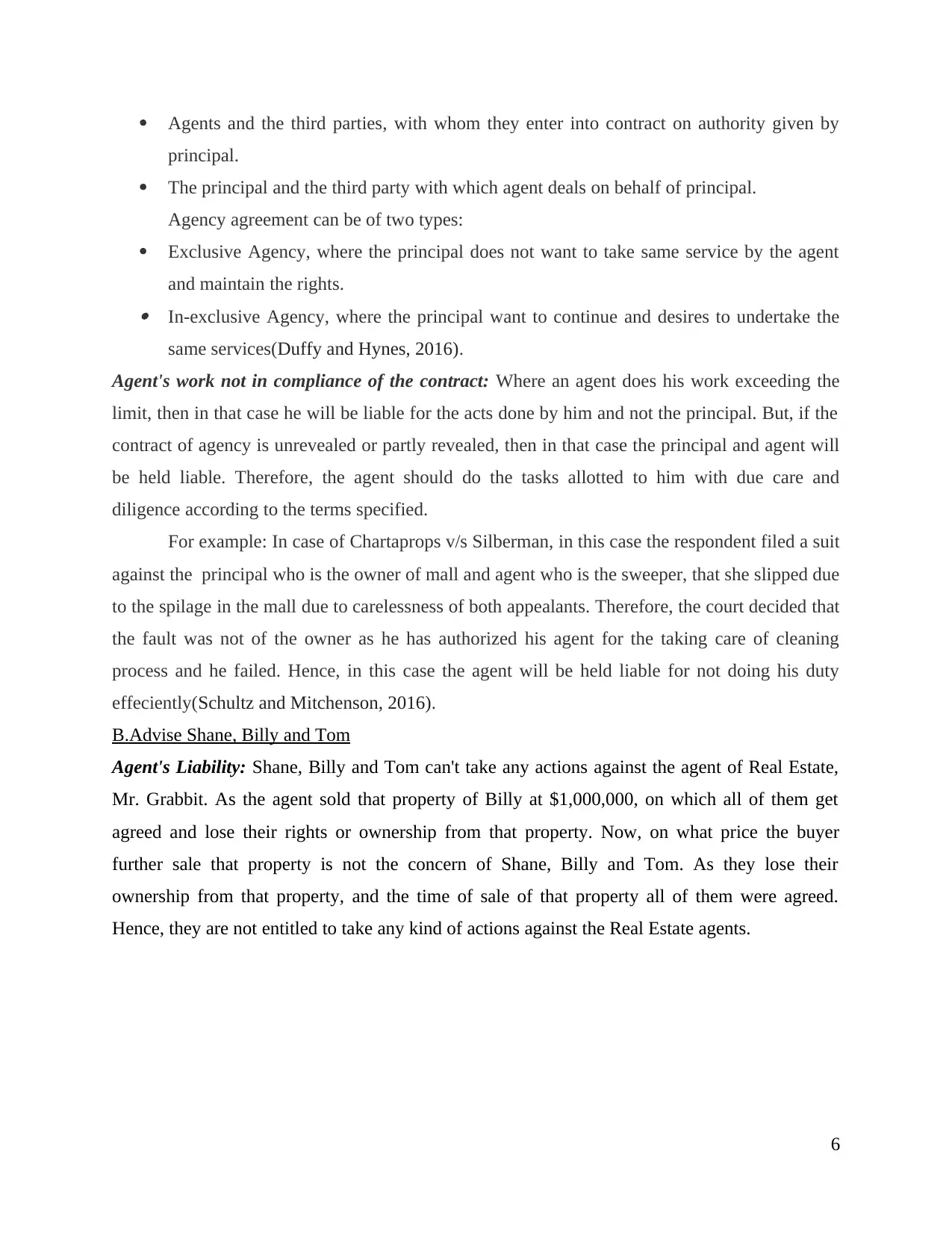
Agents and the third parties, with whom they enter into contract on authority given by
principal.
The principal and the third party with which agent deals on behalf of principal.
Agency agreement can be of two types:
Exclusive Agency, where the principal does not want to take same service by the agent
and maintain the rights. In-exclusive Agency, where the principal want to continue and desires to undertake the
same services(Duffy and Hynes, 2016).
Agent's work not in compliance of the contract: Where an agent does his work exceeding the
limit, then in that case he will be liable for the acts done by him and not the principal. But, if the
contract of agency is unrevealed or partly revealed, then in that case the principal and agent will
be held liable. Therefore, the agent should do the tasks allotted to him with due care and
diligence according to the terms specified.
For example: In case of Chartaprops v/s Silberman, in this case the respondent filed a suit
against the principal who is the owner of mall and agent who is the sweeper, that she slipped due
to the spilage in the mall due to carelessness of both appealants. Therefore, the court decided that
the fault was not of the owner as he has authorized his agent for the taking care of cleaning
process and he failed. Hence, in this case the agent will be held liable for not doing his duty
effeciently(Schultz and Mitchenson, 2016).
B.Advise Shane, Billy and Tom
Agent's Liability: Shane, Billy and Tom can't take any actions against the agent of Real Estate,
Mr. Grabbit. As the agent sold that property of Billy at $1,000,000, on which all of them get
agreed and lose their rights or ownership from that property. Now, on what price the buyer
further sale that property is not the concern of Shane, Billy and Tom. As they lose their
ownership from that property, and the time of sale of that property all of them were agreed.
Hence, they are not entitled to take any kind of actions against the Real Estate agents.
6
principal.
The principal and the third party with which agent deals on behalf of principal.
Agency agreement can be of two types:
Exclusive Agency, where the principal does not want to take same service by the agent
and maintain the rights. In-exclusive Agency, where the principal want to continue and desires to undertake the
same services(Duffy and Hynes, 2016).
Agent's work not in compliance of the contract: Where an agent does his work exceeding the
limit, then in that case he will be liable for the acts done by him and not the principal. But, if the
contract of agency is unrevealed or partly revealed, then in that case the principal and agent will
be held liable. Therefore, the agent should do the tasks allotted to him with due care and
diligence according to the terms specified.
For example: In case of Chartaprops v/s Silberman, in this case the respondent filed a suit
against the principal who is the owner of mall and agent who is the sweeper, that she slipped due
to the spilage in the mall due to carelessness of both appealants. Therefore, the court decided that
the fault was not of the owner as he has authorized his agent for the taking care of cleaning
process and he failed. Hence, in this case the agent will be held liable for not doing his duty
effeciently(Schultz and Mitchenson, 2016).
B.Advise Shane, Billy and Tom
Agent's Liability: Shane, Billy and Tom can't take any actions against the agent of Real Estate,
Mr. Grabbit. As the agent sold that property of Billy at $1,000,000, on which all of them get
agreed and lose their rights or ownership from that property. Now, on what price the buyer
further sale that property is not the concern of Shane, Billy and Tom. As they lose their
ownership from that property, and the time of sale of that property all of them were agreed.
Hence, they are not entitled to take any kind of actions against the Real Estate agents.
6
⊘ This is a preview!⊘
Do you want full access?
Subscribe today to unlock all pages.

Trusted by 1+ million students worldwide
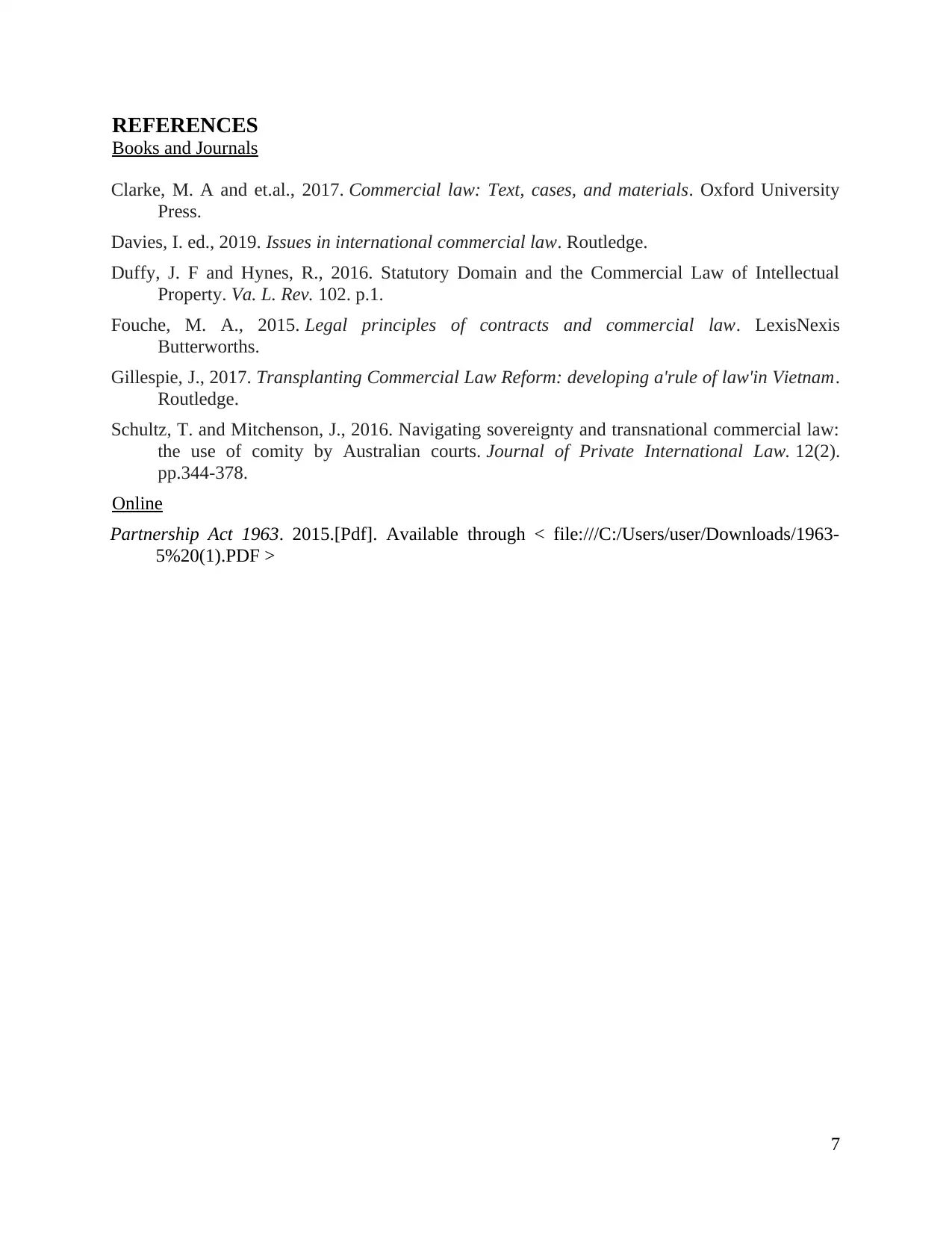
REFERENCES
Books and Journals
Clarke, M. A and et.al., 2017. Commercial law: Text, cases, and materials. Oxford University
Press.
Davies, I. ed., 2019. Issues in international commercial law. Routledge.
Duffy, J. F and Hynes, R., 2016. Statutory Domain and the Commercial Law of Intellectual
Property. Va. L. Rev. 102. p.1.
Fouche, M. A., 2015. Legal principles of contracts and commercial law. LexisNexis
Butterworths.
Gillespie, J., 2017. Transplanting Commercial Law Reform: developing a'rule of law'in Vietnam.
Routledge.
Schultz, T. and Mitchenson, J., 2016. Navigating sovereignty and transnational commercial law:
the use of comity by Australian courts. Journal of Private International Law. 12(2).
pp.344-378.
Online
Partnership Act 1963. 2015.[Pdf]. Available through < file:///C:/Users/user/Downloads/1963-
5%20(1).PDF >
7
Books and Journals
Clarke, M. A and et.al., 2017. Commercial law: Text, cases, and materials. Oxford University
Press.
Davies, I. ed., 2019. Issues in international commercial law. Routledge.
Duffy, J. F and Hynes, R., 2016. Statutory Domain and the Commercial Law of Intellectual
Property. Va. L. Rev. 102. p.1.
Fouche, M. A., 2015. Legal principles of contracts and commercial law. LexisNexis
Butterworths.
Gillespie, J., 2017. Transplanting Commercial Law Reform: developing a'rule of law'in Vietnam.
Routledge.
Schultz, T. and Mitchenson, J., 2016. Navigating sovereignty and transnational commercial law:
the use of comity by Australian courts. Journal of Private International Law. 12(2).
pp.344-378.
Online
Partnership Act 1963. 2015.[Pdf]. Available through < file:///C:/Users/user/Downloads/1963-
5%20(1).PDF >
7
1 out of 7
Related Documents
Your All-in-One AI-Powered Toolkit for Academic Success.
+13062052269
info@desklib.com
Available 24*7 on WhatsApp / Email
![[object Object]](/_next/static/media/star-bottom.7253800d.svg)
Unlock your academic potential
Copyright © 2020–2026 A2Z Services. All Rights Reserved. Developed and managed by ZUCOL.




